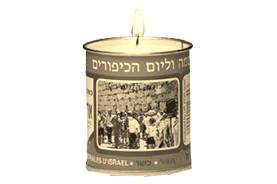 Print this Article
Print this Article

Q: What should one do if he forgot to say “HaMelech HaMishpat” on Asseret Yeme Teshuva?
A: According to Maran[1], if he remembers within three seconds (“Toch Kede Dibbur”), he may say it then. If he remembers after that time, or after starting the next Beracha, he must go back to “Hashiva”. If one only remembers after finishing the Amida, he should repeat the Amida, because the Nussah of “HaMelech HaMishpat” imply that Hashem alone judges his world and not that Hashem loves when the world runs justly – which is the meaning of “Melech ‘Ohev Tzeddaka U’Mishpat”[2]. However, the Ben Ish Hai[3] is concerned about the opinion of the Rama[4] and writes that one should not repeat the Amida. Still, most Poskim[5] follow Maran who requires one to repeat the Amida, as is the opinion of Hacham Ovadia Yosef זצ”ל[6]. In order to take the opinion of the Ben Ish Hai into consideration, Hacham Ovadia and the Ohr L’Tziyon[7] suggest that one who realized he forgot to say “HaMelech HaMishpat” after finishing the Amida, can make a condition when he repeats the Amida, that if he is not required to then the Amida is a Tefillat Nedava.
Q: Does a woman recite a Beracha for lighting candles on Erev Kippur? Does she recite “Sheheheyanu”?
A: The custom is to recite a Beracha for the lighting. If a woman will not be in the Bet Kenesset when the community recites a “Sheheyanu”, she must recite it herself. Since lighting candles on Erev Kippur is only a Minhag[8], the Mordechi[9] maintains that one should not recite a Beracha. However, the Rosh[10] and others rule that one should recite a Beracha. The general consensus of the Poskim is that a Beracha is recited[11].
If a woman will not be in the Bet Kenesset when the “Sheheheyanu” is recited, she should recite the Beracha herself. According to the Ben Ish Hai[12], she would recite it before lighting the candles, and after the lighting would she be forbidden to eat, drink, wear leather shoes etc. However, Hacham Ovadia Yosef זצ”ל [12] and Hacham Ben-Tziyon Abba Shaul זצ”ל [12] maintain that by reciting a “Sheheheyanu” she would be accepting upon herself the sanctity of Yom Kippur, and thus would not be able to light candles. Therefore, they write, she should recite the Beracha after lighting candles (having already taken her leather shoes off). If she forgot to recite “Sheheheyanu” then, she may recite it throughout the entire day.
Q: Do we recite the Beracha of “She’asa Li Kol Tzorki” on Yom Kippur?
A: The consensus of the Poskim is that one should recite “She’asa Li Kol Tzorki” on Yom Kippur. Maran[13] follows the opinions[14] that Birkot HaShahar were instituted as per each individual’s situation, while the Rama follows the opinions[15] that even if a particular individual is not able to enjoy a specific benefit – he may nevertheless recite the Beracha for the general public’s benefit. Nevertheless, the Aharonim write[16] that the Sephardic custom is to follow the Rama in this matter, as is the opinion of the Mekubalim as well[17].
Accordingly, the Beracha of “She’asa Li” (in which we are thanking Hashem for basic needs such as shoes) would be recited even on Yom Kippur, despite the fact that it is forbidden to wear leather shoes, because the benefit still exists, either because one is allowed to wear leather shoes in place of danger[18], or because one may still benefit from wearing non-leather shoes[19]. Although many Mekubalim write that one should not recite this Beracha on Yom Kippur[20], the Hacham Ovadia follows the general opinion of the Aharonim[21].
Sources:
[1] או”ח סי’ תקפב ס”א ע”פ הרי”ף (ברכות ז. מדה”ר) רמב”ם (פ”י מתפילה הי”ג) רא”ש (מס’ ברכות פ”א סט”ז) ועוד רבים
[2] רבינו מנוח (ס’ המנוחה עמ’ סז)
[3] ש”א פר’ נצבים סי”ט, וכ”כ בכה”ח סי’ קיח סק”א, והוסיף שלא טוב לחזור להתפלל נדבה, דתפילת נדבה צריכה כוונה מרובה
[4] או”ח סי’ קיח ס”א ע”פ תר”י ברכות (שם) והטור (או”ח סי’ קיח) ועוד
[5] פר”ח, מטה יהודה, ברכ”י, מאמ”ר, חסד לאלפים (סי’ תקפב) ועוד רבים, וכן פשט המנהג
[6] יבי”א (ח”ב ס”ח והלאה) ובחזו”ע (עמ’ קצג) שהעיקר כדברי הפוס’ כהשו”ע וכן המנהג, ובמקום מנהג לא אמרינן סב”ל [שו”ת תה”ד (סי’ לד), וע”ע בשו”ת ר”פ (ח”ב ס”ז) שכ”כ בשם האחרונים]
[7] ח”ד פ”ו ס”ד, אך דעת האול”צ שאף אם נזכר אחכ”ד קודם שסיים את תפילתו, יסיים את תפילתו וישוב להתפלל תפילת נדבה על תנאי, כנ”ל
[8] פסחים נג:
[9] שם (פ”ד סי’ תרט) וביומא (פ”ח סי’ תשכח)
[10] יומא (פ”ח סי’ כז), וכ”כ רבינו ירוחם (נ”ז ח”ב דף נ ע”ד) ועוד, משום שלום בית
[11] אף שהפר”ח ס”ל שאף מרן חושש לסב”ל שכתב בלשון ‘ויש מי שאומר’, וגם בערך השלחן, שלחן גבוה, ועוד אחרונים (סי’ תרי) כתבו שלא לברך מ”מ הבא”ח (פר’ וילך ס”ט), כה”ח (סי’ תרי ס”ק יב), מל”ח (סי’ טז סל”ב), חזו”ע (עמ’ רנו), אול”צ (ח”ד פי”א ס”ב) ועוד רבים, כתבו לברך ושזו אף דעת מרן, וכן מנהג העולם, ובמקום מנהג ל”א סב”ל
[12] שם
[13] או”ח סי’ מו ס”ח
[14] רמב”ם (פ”ז מתפילה הל’ ז-ט), וראב”ד, הו”ד בכמה ראשונים בסוף ברכות
[15] רמב”ן ור”ן פסחים (ז:), כל בו בשם הגאונים שכן המנהג, ועוד רבים
[16] פר”ח, מטה יהודה, ברכ”י (שם), ר”פ (ח”ב ס”ח) ועוד, ובמקום מנהג ל”א סב”ל
[17] שער הכוונות (דף א ע”ג) ועוד
[18] רא”ש (יומא פ”ח ס”ג) בשם העיטור (הל’ יוה”כ, קו ע”ג)
[19] שו”ת רשב”ץ (ח”ב סי’ קפו) והחיד”א בשיו”ב (סי’ מו ס”ק ג-ד) ועוד
[20] חיד”א (שם), בא”ח (ש”א פר’ וישב ס”ט), כה”ח (סי’ מו ס”ק יז) ועוד
[21] יבי”א (ח”ט ס”ח) חזו”ע (עמ’ שכ) שאין לנו עסק בנסתרות, ועוד שי”ל כמש”כ במקו”ח (סי’ מו) שהיא ברכה כללית על כל צרכי האדם.